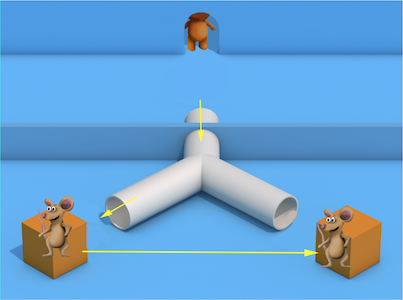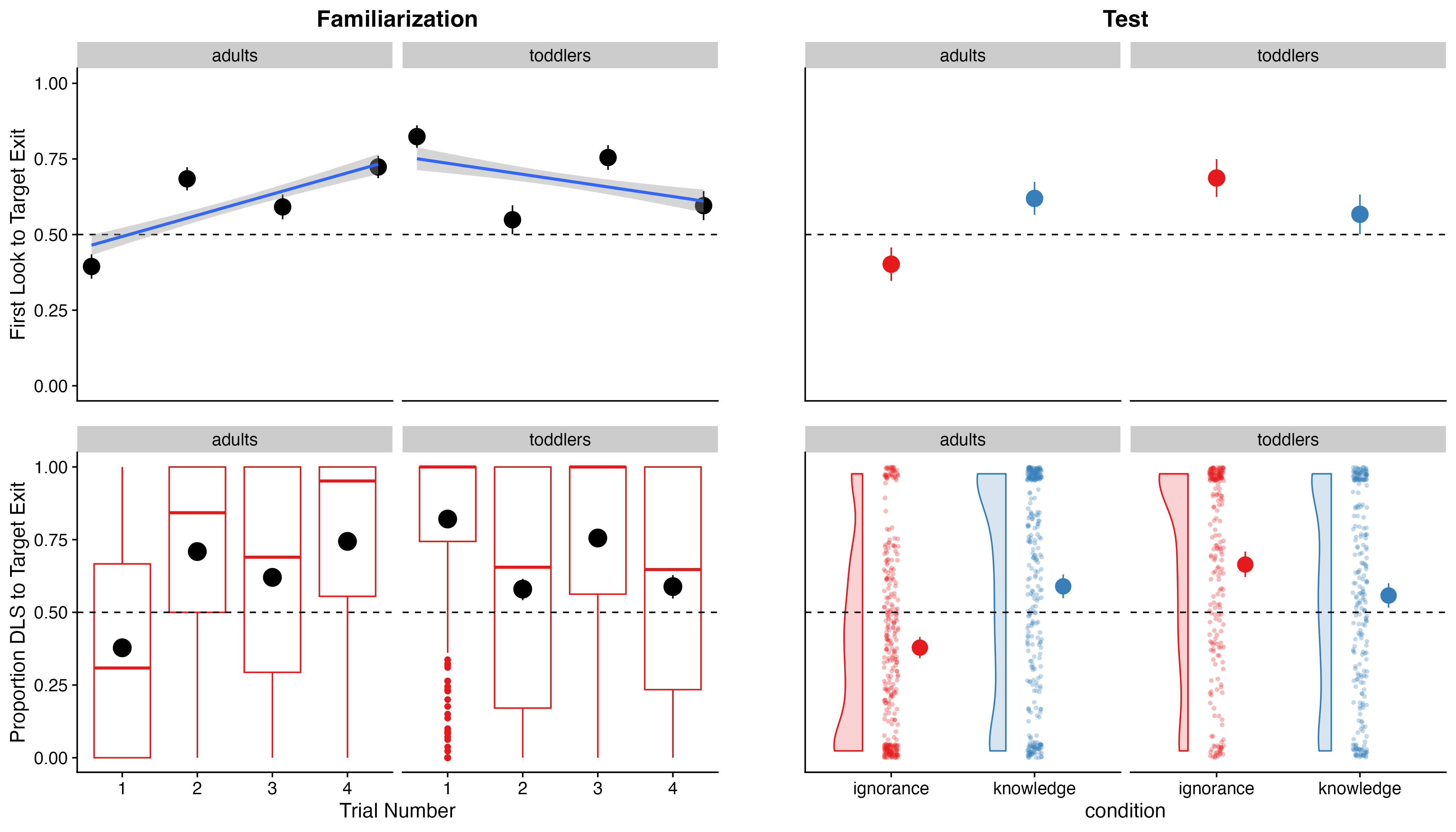
Project Overview
- Status: Phase 1: Stage 2 manuscript under revision
- Stage 1 Registered Report given 'In Principle Acceptance' at Child Development
In this project, we investigate a fundamental feature of human social cognition: Theory of Mind (ToM), the ability to ascribe mental states to agents. One of the central tests for ToM is the false belief task, which requires participants to predict an agent’s action based on her/his (mis)representation of the world. Using a false belief task implemented through 3D-animated videos, we examine whether toddlers (18- to 27-month-olds) and adults show anticipatory looking indicating false belief ascription to another agent. Our team includes the authors of the original studies as well as researchers who conducted previous replication attempts. Our consortium brings together scholars from a wide range of theoretical perspectives.

Phase 1: Knowledge / Ignorance (completed):
In a first step, we examined whether toddlers’ and adults’ anticipatory looks show that they distinguish between two basic forms of epistemic states: knowledge and ignorance. Adults (n = 703) clearly differentiated between those conditions and showed more anticipatory looking towards the target location in the knowledge than in the ignorance condition. Surprisingly, in toddlers (n = 521) this pattern was flipped: They showed more anticipatory looks towards the target location in the ignorance condition (see Fig.1).

Phase 2: Knowledge / Ignorance Adaption (ongoing):
The next step for toddlers will now be to investigate more systematically the source of the puzzling findings and clarify whether they indicate competence or mere performance limitations.
Phase 3: False Belief in Adults (ongoing):
For adults, we will now move on to probe whether their spontaneous action anticipation is also sensitive to more complex kinds of epistemic states, such as true and false beliefs.
Following the anticipatory looking studies, we hope to continue the project with other measures such as Violation of Expectation, and interactive tasks.
Links
- Materials, Protocols, and Documentation: MB2-OSF, MB2 Lab Manual, MB2 Collaboration Agreement
- Data and code: MB2-GitHub
- Listserv: join here (click on “for access, try joining the group”)
- Slack: MB workspace (join the #mb2-general channel)
Project Leads
- Tobias Schuwerk, Ludwig Maximilian University of Munich, Germany [email]
- Dora Kampis, University of Copenhagen, Denmark [email]
- Hannes Rakoczy, University of Göttingen, Germany [email]
- Michael Frank, Stanford University, United States [email]
MB2 Contributors
NOTE: Default table ordering is by author order in the Stage 2 manuscript. You can filter, group, and/or sort entries by any field.
Publication
Stage 1 Registered Report
Schuwerk, T.*, Kampis, D.*, Baillargeon, R., Biro, S., Bohn, M., Byers-Heinlein, K., Dörrenberg, S., Fisher, C., Franchin, L., Fulcher, T., Garbisch, I., Geraci, A., Grosse Wiesmann, C., Hamlin, K., Haun, D. B. M., Hepach, R., Hunnius, S., Hyde, D. C., Karman, P., … Rakoczy, H. (accepted pending data collection). Action anticipation based on an agent's epistemic state in toddlers and adults. Child Development. PsyArXiv. https://doi.org/10.31234/osf.io/x4jbm (*co-first authors)
To cite, use (Schuwerk & Kampis et al., accepted pending data collection)
Stage 2 Registered Report (preprint)
Schuwerk, T.*, Kampis, D.*, Alessandroni, N., Altvater-Mackensen, N., Arias-Trejo, N., Axelsson, E. L., Baillargeon, R., Baumann, A.-E., Bernard, C., Biro, S., Blankenship, T., Blomberg, I., Bohn, M., Bradford, E. E. F., Byers-Heinlein, K., Canudas Grabolosa, I., Chen, E. M., Chen, X., Corbit, J., … Frank, M. C., Rakoczy, H. (2025, September 9). Action Anticipation Based on an Agent's Epistemic State in Toddlers and AdultsT. PsyArXiv. https://doi.org/10.31234/osf.io/x4jbm_v2
To cite, use (Schuwerk & Kampis et al., 2025)
Funding
- MB2 is supported by a grant from Deutsche Forschungsgemeinschaft